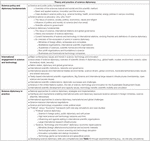As a new and transdisciplinary field, the growing interest in science diplomacy education has been well documented, including in our S4D4C needs assessment (Degelsegger-Marquez et al., 2019). Most teaching and training in science diplomacy has been done through extracurricular courses and workshops as part of the capacity building portfolios of international organisations (sometimes targeting specific geographic or disciplinary audiences), or self-organised by university student groups. The annual AAAS-TWAS science diplomacy summer course and the S4D4C training activities are just some of the examples highlighted.
But over the last few years, we have seen increasing demand for science diplomacy education in higher education institutions. Marga and Jean-Christophe map the current landscape of offerings, including seminar series, workshops, science policy courses and thematic diplomacy classes (e.g. environmental diplomacy, health diplomacy or water diplomacy) as well as professional development initiatives for graduate students in the natural and technical sciences.
However, as there are no official courses at universities yet, Marga and Jean-Christophe propose a framework for developing a science diplomacy curriculum in higher education which is adaptable to a wide range of undergraduate and graduate programs and disciplines. The framework is content and skills-based, emphasizing experimental learning methodologies such as role-play simulations and “learning from each other” to bridge the divide between scientists and diplomats:
While #sciencediplomacy still lacks a formal educational path and training opportunities remain limited, we hope our work will spark further thinking and new developments to broaden #scidip training at universities, diplomatic academies, international organizations & others. /FIN pic.twitter.com/Odv9WTMPzY



